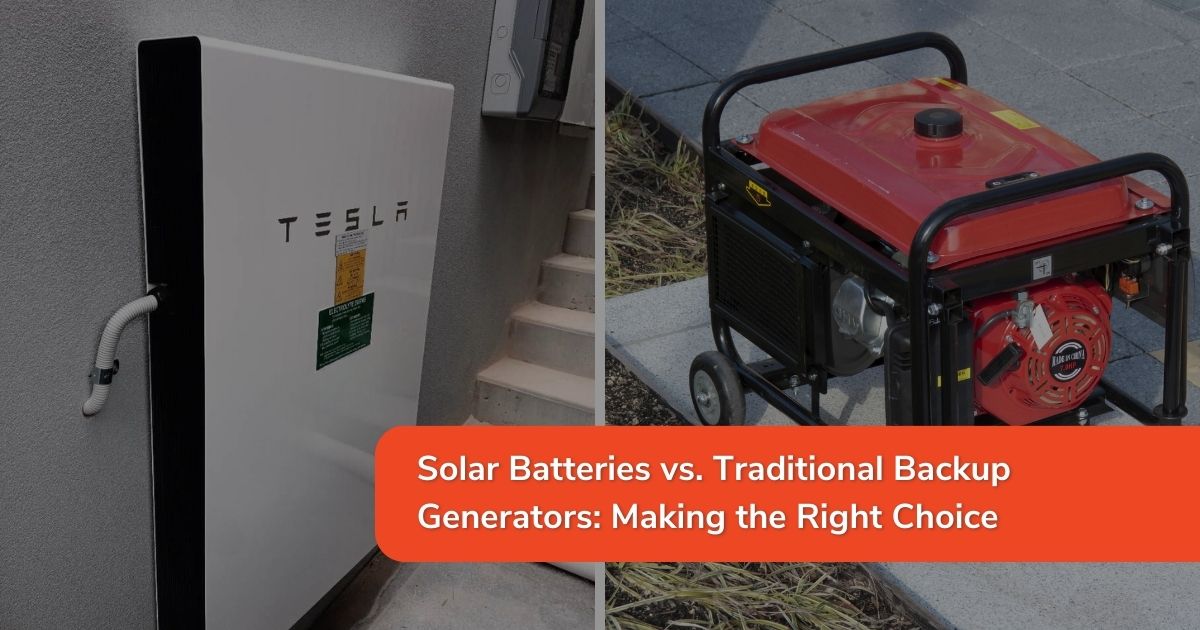Solar Batteries vs. Traditional Backup Generators

In a country that's no stranger to power outages due to extreme weather conditions, the decision between adopting solar batteries or sticking with traditional backup generators is becoming increasingly pertinent. As consumers weigh the environmental benefits against costs and practicality, it's essential to understand which solution aligns best with their needs and values. Here, we dive into the specifics to help Australian homeowners navigate this pivotal choice.
Traditional Backup Generators: The Workhorse of Blackouts
When it comes to reliability during power cuts, traditional backup generators have long been the go-to solution for Australian homes. Known for their robustness and ability to deliver a significant amount of power, generators are undeniably effective. However, they do come with their own set of drawbacks.
Pros of Generators
Generators can offer a substantial and immediate power supply, particularly important for those needing to maintain critical electrical systems, such as medical equipment. They also do not rely on the sun or weather conditions, ensuring a constant energy supply even during prolonged overcast periods.
Cons of Generators
Despite their dependability, generators are not without fault. The need for regular maintenance and refueling makes them a relatively high-maintenance investment. Moreover, their emissions contribute to air pollution, a growing concern for sustainability in Australia.
Solar Batteries: The Rising Star of Renewable Resilience
As the solar industry advances, solar batteries like SolarEdge Home Battery & Tesla Powerwall represent a significant leap in the efficiency and convenience of backup power solutions. Unlike generators, they harness the power of the sun, making them an environmentally friendly alternative with an edge in the long term.
Pros of Solar Batteries
Solar batteries store energy from your solar panels for use when the sun isn't shining, effectively making them a clean, sustainable, and increasingly cost-effective solution. They require minimal upkeep, are virtually silent in operation, and can be seamlessly integrated into your existing solar system.
Cons of Solar Batteries
It's not all sunshine with solar batteries, as their upfront cost remains a barrier for many. Additionally, their storage capacity can be limiting, especially if the frequency and duration of outages are unpredictable or varied.
Comparison and Considerations: What Fits Your Lifestyle?
The choice between solar batteries and traditional backup generators isn't cut and dry. It depends on various factors, including your home's energy consumption, budget, and commitment to sustainability.
Cost Comparison
In terms of initial cost, traditional backup generators are commonly cheaper to install. However, when considering the life cycle of the investment, ongoing fuel and maintenance costs may tip the balance in favor of solar batteries.
Reliability and Performance Comparison
In terms of reliability, generators offer immediate power, but they do require fuel that may not always be readily accessible. Conversely, solar batteries are constantly charged during daylight hours, ensuring a renewable and consistent supply of power, though the system itself may be less powerful in a single burst than a generator.
Suitability for Different Energy Needs
For homeowners with high energy needs during outages, such as those with large families or extensive home office requirements, a generator's high output capacity may be more suitable. Smaller households or those with more modest energy needs could easily be covered by a solar battery system.
Making an Informed and Green Choice
Ultimately, the decision between solar batteries and traditional backup generators is a personal one, guided by your specific needs and values. As Australia continues its green energy revolution, considering the long-term environmental impact of your choice is crucial. It's about creating a resilient and sustainable energy plan that not only keeps the lights on but also ensures a brighter, greener future for all Australians. For expert guidance tailored to your specific needs, contact Smart Energy Answers today.
%20(1).png?width=265&height=96&name=www.smartenergyanswers.com.auhs-fshubfsSmart%20Energy%20Answers%20Logo%20(HIRES)%20(1).png)

.png?width=514&height=121&name=Tesla%20Powerwall%203%20(new).png)







